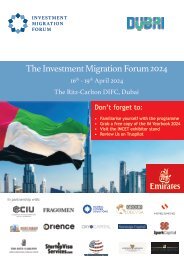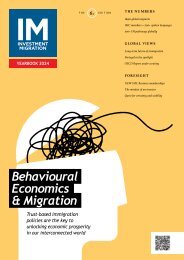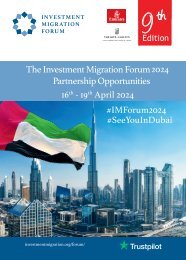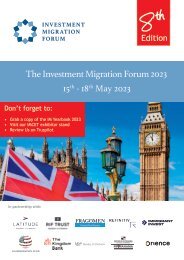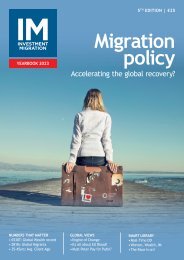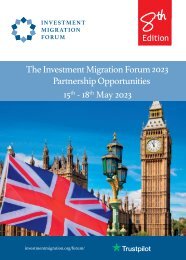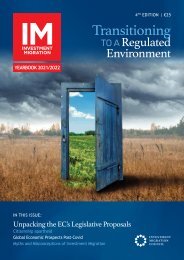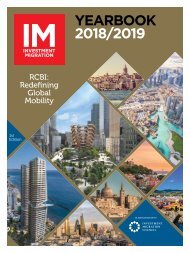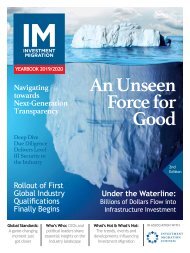IM Yearbook 2020/21
Born from the need for a global, credible, “go-to” publication, the 3rd IM Yearbook offers valuable access to a prime target audience of top industry influencers, decision makers, and the foremost referral network to the world’s most influential Investment Migration programmes: Government officials such as Heads of CIU’s, policy makers, academics, migration agents, law firms, wealth managers, financial advisors, real estate developers, and international firms involved in investment migration.
Born from the need for a global, credible, “go-to” publication, the 3rd IM Yearbook offers valuable access to a prime target audience of top industry influencers, decision makers, and the foremost referral network to the world’s most influential Investment Migration programmes: Government officials such as Heads of CIU’s, policy makers, academics, migration agents, law firms, wealth managers, financial advisors, real estate developers, and international firms involved in investment migration.
You also want an ePaper? Increase the reach of your titles
YUMPU automatically turns print PDFs into web optimized ePapers that Google loves.
There is scope to introduce a minimum standard<br />
across the board, but the responsibility<br />
also lies with the due diligence provider<br />
to highlight any areas lacking that will result in<br />
ineffective due diligence, on a case by case basis.<br />
Eddy Leviten<br />
How has the covid-19 pandemic affected<br />
due diligence operations and particularly<br />
your ability to verify information?<br />
EL: We had planned ahead to ensure our business was resilient and we<br />
migrated our staff to home working with no disruption to our clients.<br />
In respect of our verification processes we did encounter some delays to<br />
checks in-country, where government offices were closed and where travel<br />
restrictions impacted on checks made on properties and locations in certain<br />
territories. However, we have not had to curtail nor change the way we verify<br />
information and have been able to continue to deliver reports to clients<br />
within acceptable timescales. Inevitably, also, given the political and social<br />
instability within some of the territories in which we conduct verification<br />
we are constantly adapting our processes to ensure we can deliver the most<br />
effective results for clients without compromising the accuracy of reports.<br />
SW: Early on Refinitiv decided to move the entire company to a<br />
virtual office environment before lockdowns were mandated by many<br />
governments. We’re also fortunate to have robust and flexible technology.<br />
We had upgraded our suite of collaboration and communication<br />
tools recently, meaning we had access to teamwork applications,<br />
and the transition to virtual office was relatively easy for us. As for<br />
data retrieval and verification of information, of course, we observed<br />
some delays in the retrieval of information from official sources in<br />
countries with lockdown measures, especially those with less advanced<br />
digitised databases. When it comes to local human intelligence, since<br />
most of the industry source queries are within our existing network,<br />
it has been possible to maintain a high rate of on-time delivery, as<br />
telephone interviews replaced face-to-face meetings partially.<br />
LA: Covid-19 has had an impact on industry operations around the world,<br />
and the due diligence industry is no exception. Proper due diligence is<br />
comprised of information garnered from public and proprietary data<br />
sources, as well as local, in-country intelligence, comprised of human<br />
source information, manual records searches, and in-person access to<br />
official government ministries. In this way, much of our most valuable<br />
intelligence was at the mercy of jurisdictional regulations and restrictions.<br />
As Covid-19 intensified, most jurisdictions closed nonessential<br />
businesses, implemented lockdown mandates and<br />
banned public gatherings. These initial measures undoubtedly<br />
impacted, and in certain cases temporarily halted, aspects of our<br />
due diligence process, most significantly in the verification of<br />
documents and credentials, reputational inquiries and site visits;<br />
all of the areas requiring in-person interaction and contact.<br />
Fortunately for due diligence operations, most countries experienced<br />
some degree of lockdown measures at the same time, and only for a short<br />
period of time, during which we all—providers and clients alike—took a<br />
bit of a step back, got our new at-home worlds in order, and then resumed<br />
operations at a time when most of the essential aspects of our due diligence<br />
were able to proceed with some semblance of normalcy and without delay.<br />
JS: When the pandemic intensified, we internally transitioned to 100%<br />
remote work overnight across all of our locations. While working from<br />
home was a relatively new concept for most of our researchers, the transition<br />
has been remarkably seamless. Most digital sources have remained<br />
unaffected during the pandemic though some in-person and telephone<br />
verifications have been impacted by remote work. At the beginning of the<br />
pandemic, there were some delays due to government shutdowns, but we<br />
have recently seen a normalisation of lead times on most verifications.<br />
The coronavirus<br />
accelerated the adoption<br />
of digital technologies<br />
by most Citizenship by<br />
Investment Units (CIUs),<br />
which started to accept<br />
online applications and<br />
are requiring fewer<br />
documents to lodge<br />
applications and start the<br />
due diligence process.<br />
While this has made the<br />
application process easier<br />
for investors, do you have<br />
concerns from a due<br />
diligence perspective?<br />
JS: The due diligence process relies<br />
heavily on the review and verification<br />
of documentation provided by the<br />
applicants. As long as these are<br />
transmitted to the due diligence providers<br />
in a secure environment, there should<br />
be no concerns. In fact, if the pandemic<br />
has taught us anything, is that virtual<br />
environments can facilitate the process<br />
and potentially reduce the turnaround<br />
times without compromising<br />
the quality of the due diligence.<br />
SW: This pandemic indeed unlocked so<br />
many new opportunities people didn’t<br />
think of or were not bold enough to<br />
implement. We see a lot of innovation<br />
happening in the client onboarding<br />
processes—within the investment<br />
migration sector but also in the banking<br />
sector. The lower level of document<br />
requirements should, however, be<br />
balanced with a robust verification<br />
process and with independent opensource<br />
information collection. While<br />
some documents may not be critical,<br />
others—like those proving the legitimate<br />
origin of the applicant’s sources of<br />
wealth (SoW) and Sources of funds<br />
(SoF)—remain critical to ensure that<br />
CIUs do not accept illegitimate funds.<br />
Common sense and a risk-based approach<br />
need to be applied and adhered to<br />
in the application-vetting process.<br />
Investment Migration <strong>Yearbook</strong> 2O2O/2O<strong>21</strong> 79




